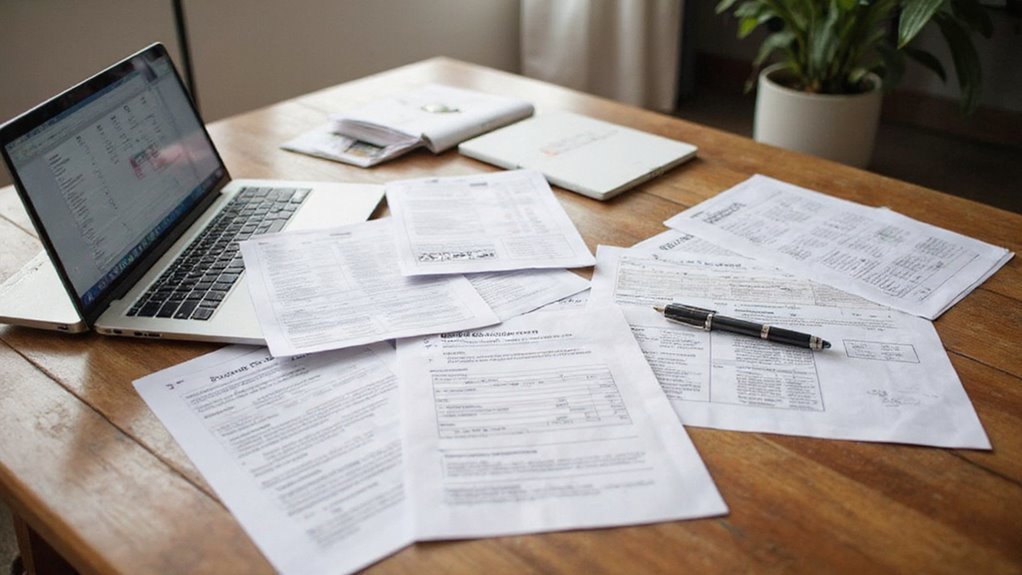If you’re eyeing a small business loan, there are some new rules for wrap your head around. Initially off, you’ll need in order to prove you’re a U.S. citizen or a permanent resident—no foreign owners allowed. You’ll also need a decent credit score (above 690 helps!), and expect a minimum 10% down payment. Additionally, prepare for stricter documentation and possible environmental assessments. Curious about the nitty-gritty? Stick around, and I’ll break down the details for you!
Key Takeaways
- U.S. citizenship or lawful permanent residency is required for all owners seeking SBA loan eligibility.
- Environmental reviews are necessary; Phase 1 ESAs help identify potential hazards before loan approval.
- Stricter underwriting standards mandate a minimum 10% down payment and a higher credit score for successful applications.
- Essential documentation includes personal background forms, business financials, a business plan, and proof of environmental compliance.
- Strong financial health indicators, like a solid credit score and positive cash flow, are crucial for favorable loan terms.
Citizenship and Ownership Requirements

When you’re ready for taking the plunge into small business ownership, understanding the citizenship and ownership requirements for securing an SBA loan is vital. For qualifying, every owner must be a U.S. citizen or a lawful permanent resident—no ifs, ands, or buts! That means that if you’re hoping to snag those government-backed guarantees for finance your dream business, you’ll need for show proof regarding citizenship. Lenders dig thoroughly, checking creditworthiness and ensuring all owners comply with these eligibility rules. Even a tiny bit of foreign ownership can disqualify you, making that vital for get your documents in order. Remember, securing an SBA loan isn’t just about numbers—it’s about credibility and meeting those requirements like a pro! Additionally, many lenders compare the benefits of SBA loans vs. revenue financing when assessing your business’s financial potential, which can influence your funding options.
Understanding Environmental Reviews
Understanding the world of small business loans can feel like a maze, especially with all the rules and requirements you’ll encounter. Understanding environmental reviews is essential, and here’s what you should know:
- Environmental assessments are common for certain loans.
- Phase 1 ESAs can reveal potentially hazardous issues.
- SBA loan programs often require environmental due diligence.
- Loan approval contingencies may hinge upon assessment results.
- Compliance with regulations guarantees a smoother process.
- Lenders may assess financing options based on the environmental review outcomes.
You don’t want any pesky surprises down the line! By tackling these environmental reviews early, you can strengthen your chances for a successful loan approval and avoid any headaches. Get ready in order to traverse those mazes with confidence!
Stricter Underwriting Standards
Since the environment for securing small business loans just got a bit more complicated, this is crucial in order to grasp the new stricter underwriting standards that are being rolled out. These changes are intended to guarantee lenders focus on key elements like profitability, good credit, and adequate collateral.
Here’s a quick look at how these factors now play into the process:
| Factor | Requirements |
|---|---|
| Down Payment | 10% minimum equity injection for startups |
| Good Credit | Higher credit score needed |
| Collateral | Required for larger loans |
| Profitability | Demonstrate stability |
| Approval Speed | May take longer with new docs |
Additionally, it’s important to note that loans for buying a company can vary in terms of terms and interest rates based on these new standards.
Documentation Needed for Loan Applications

Getting a small business loan might feel like preparing for a big exam, but don’t worry—once you know what documents for gathering, you’ll be ready for acing that! For simplifying the process, here’s a concise list for vital documentation you’ll need:
- Personal Background Forms (SBA Form 1919 or 912)
- Business Financials, including an Income Statement
- Credit Report showing your score (aim for above 690!)
- Business Plan outlining your goals
- Environmental Compliance if real estate’s involved
It’s also important to remember that lenders in New York often require essential paperwork for business loans to fully assess your application. As borrowers apply for loans, bear in mind that good credit improves approval odds and helps optimize the application process. The requirements for a small business acquisition loan can feel overwhelming, but having these documents ready will make the path smoother!
Overview of Loan Types and Associated Fees
While you’re setting your sights for acquiring a small business, understanding the different types from loans available can feel like maneuvering a maze—exciting but possibly overwhelming. Think from business loans as your trusty GPS. You’ve got options like term loans for those big purchases and SBA loans with competitive interest rates that won’t leave you gasping for air. Then, there’s the charming world from secured verses unsecured options, which can sway your loan amounts greatly. Microloans are friendly little helpers for startups if you need less than $50,000. Additionally, many of these funding options are backed by the government through government-funded business loans, enhancing your chances of approval. Remember, every loan comes with its share from fees, from origination towards potential late payment charges. So weigh your choices wisely, and soon, you’ll be in the swift track towards business ownership!
Financial Health and Credit Score Considerations
When you’re eyeing that small business loan, don’t overlook your financial health and credit score—like trying for jumping into a pool without checking the water beforehand! Your credit score plays a vital role in getting approved and snagging the best terms, so this pays for keeping an eye over this. Additionally, lenders will want for seeing that your finances are in good shape, so that’s like showing up at a job interview in your Sunday best—presentation matters!
Assessing Financial Stability
How can you tell if a small business is financially healthy enough for making the leap into ownership? Understanding a business’s financial stability is essential for securing financing and ensuring you’re not jumping into murky waters. Here are some key indicators for checking:
- Gross Profit Margin: A high margin shows efficiency in producing goods.
- Revenue Growth Rate: Look for consistent annual growth.
- Operating Cash Flow: Positive cash flow means the business can meet obligations.
- Debt-to-Equity Ratio: That reveals how much debt exists versus owner equity.
- Expense Ratios: Keep an eye upon major expenses for controlling costs.
When lenders approve financing, they’ll look at these factors. Solid financial health helps entrepreneurs secure capital and potentially access favorable interest rates. Collateral secures the loan too!
Importance of Credit Scores
Ever wonder why your credit score seems to hold such power over your dreams for business ownership? Think of the credit score as your financial superhero cape! When you’re asking, “Are there loans for purchasing a small business with bad credit?” the answer’s often a resounding, “Well, maybe, but that’ll cost ya.” Solid credit scores seriously enhance your chances of snagging the best loans for purchasing a small business and landing better interest rates. A score above 700 can open doors galore! So, how do you get a loan for buying a business? Start by nurturing that number—pay bills promptly, reduce debt, and keep your credit utilization low. This is vital for financing your dream franchise purchase, after all!
Frequently Asked Questions
How Long Does the Loan Approval Process Typically Take?
Typically, the loan approval process takes 60 through 90 periods. Nevertheless, you can expedite the process by preparing all documents upfront and collaborating closely with lenders in order to guarantee a smoother experience and quicker approval.
Can I Use Personal Assets as Collateral for an SBA Loan?
They say, “Don’t put all your eggs in one basket.” Yes, you can use personal assets as collateral for an SBA loan, helping you secure funding while minimizing lender risk and promoting innovation in your business path.
What Happens if I Default on My SBA Loan?
If you default in your SBA loan, your lender can seize collateral, negatively impact your credit score, and pursue collections. This is essential in order to negotiate early with your lender in order to investigate potential solutions before facing serious consequences.
Are There Any Grants Available for Purchasing a Small Business?
You might find grants for purchasing a small business, but they’re rare. Focus upon federal and local options, like the SBA grants. These can seriously enhance your budget and innovation potential as you venture in.
Can I Apply for an SBA Loan Without a Business Plan?
You can apply for an SBA loan without a business plan; but, having one improves your chances. Strong financial documentation and cash flow are essential, so focus upon those in order to increase your application’s appeal.






